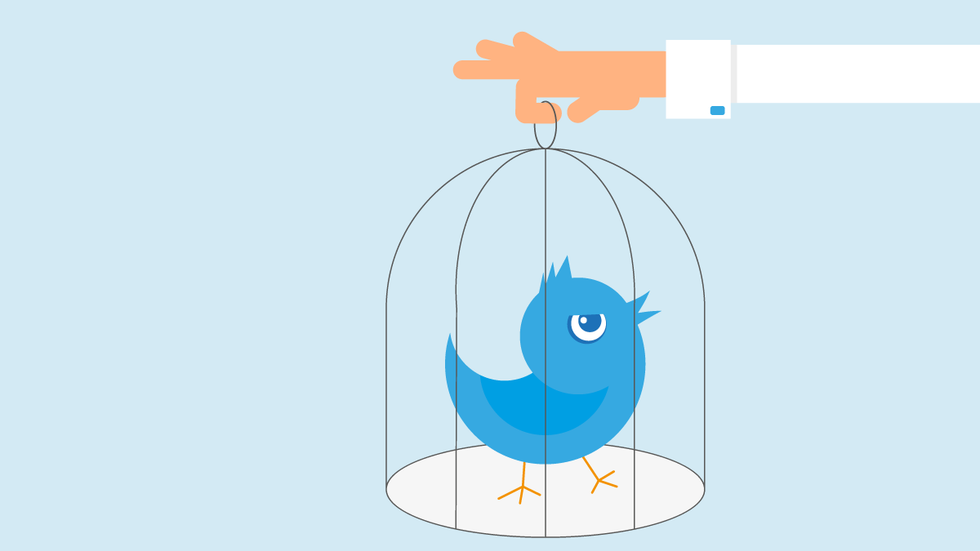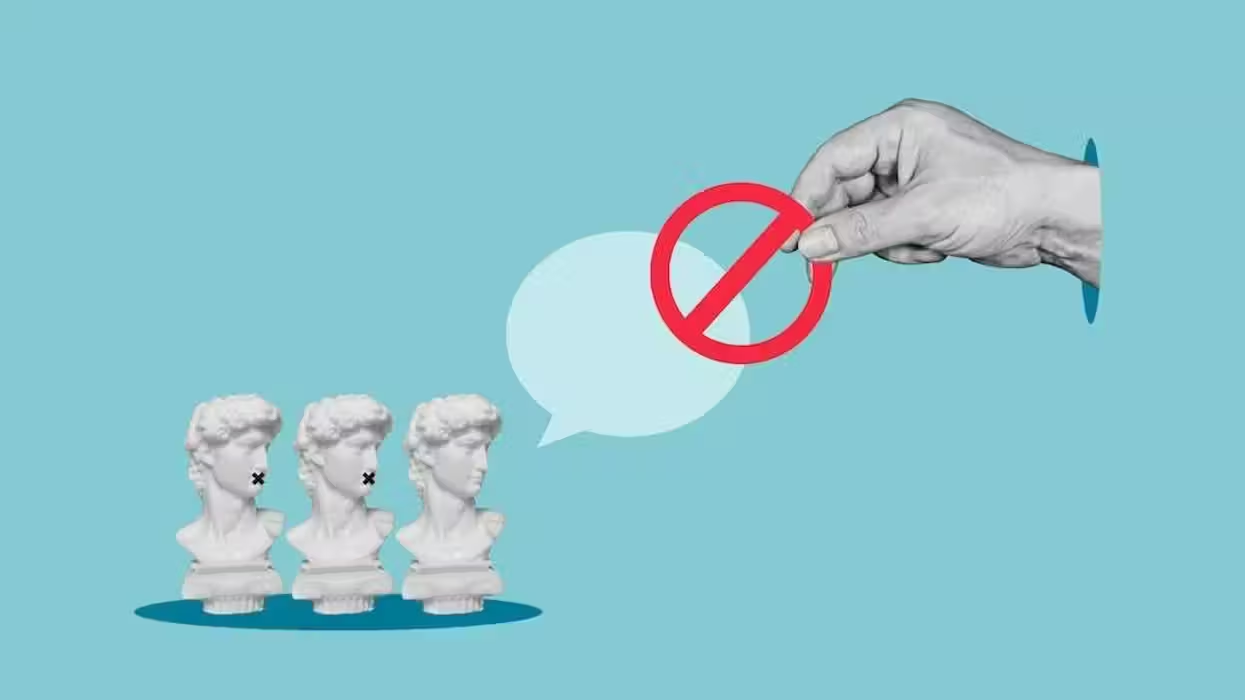
© 2026 Blaze Media LLC. All rights reserved.
No religious liberty rights, but a right to someone else’s Twitter account?!
March 12, 2018
Each new day brings another court ruling more absurd and damaging to our republic than the previous one. And each new ruling is met with stunning silence from the other two branches of government. This time, courts are preparing a new constitutional right to access someone else’s Twitter account, even as they violate the inviolable provisions of the First Amendment – to abide by one’s conscience with one’s own private property.
When I saw the CNBC article on Thursday titled, “A federal judge is skeptical about whether Trump can block Twitter users,” I thought it was an early April Fools’ parody. But then I remembered that U.S. District Judge Naomi Reice Buchwald had actually granted standing to a random plaintiff to sue Trump for blocking him on Twitter. Because we now live in a time when judges can place any political question – even a teenager catfight on social media – into court as a justiciable case, and the other branches of government will regard their judicial malpractice as “the law of the land.”
For years we had an epidemic of frivolous lawsuits between two parties under civil law. They were disruptive to our economy. But now we have frivolous constitutional lawsuits that are literally destroying our republic – erasing the most unambiguous rights of the Constitution while creating new imaginary rights that infringe upon the real rights, all the while elevating the role of the district judge to that of a king and even God.
On Thursday, during oral arguments in the Twitter catfight case, judicial goddess Buchwald reportedly told Trump’s lawyer, “Once it [Twitter] is a public forum, you can't shut somebody up because you don't like what they're saying."
By the way, Buchwald is the same person who accused Sarah Palin of using her son with Down syndrome, Trig, as a prop during the 2008 election. I guess she doesn’t want anyone blocking her insensitivity from their timelines on Twitter.
This is an exceedingly dangerous territory the judicial statists have just entered. They are now saying that merely blocking someone from following you on Twitter is tantamount to physically shutting them up from talking and is a violation of the First Amendment.
Think about this for a moment: The federal courts are almost unanimously saying that you must violate your conscience and serve gay weddings with your private property. You are not allowed to merely mind your own business; you will be forced to take action for someone else, according to the corrupt legal profession. And now these same people think that you have the right to someone else’s Twitter account.
Isn’t it also interesting that the Left has no problem with the Twitter corporation itself banning conservatives as “haters” (while they allow ISIS accounts), but private users cannot block other people from seeing their tweets?
Folks, this is really simple. Private property is private property. All of the following is true:
Twitter, as a private company, has the right to grant an account to anyone it chooses. I have a right to talk and write about anything I want without the government locking me up, but I don’t have a right to someone else’s forum. Yes, Twitter can ban me or anyone else.
Your private Twitter account granted to you by the organization is yours (until suspended), and nobody has a constitutional right to see your tweets.
I have the right to run my private business in accordance with my conscience, and you have no right to obtain employment or services from me.
In all of these cases, people are free to make political arguments against the policies and views of individuals and companies. We have the right to real free speech, using any platform we can find, to show Twitter’s hypocrisy as a matter of policy. Others have the right to make fun of Trump for blocking them. Still others have the right to weigh in on the prudence or “morality” of a private entity denying a service. But nobody has a constitutional right to be entitled, as a legal matter, to someone else’s property.
In the past, it took about 15-30 years for liberals to transform their political positions into legal imperatives. Now we have reached a crisis in the legal profession where essentially every Democrat political belief is now instantly enshrined as a constitutional right or mandate.
For example, last week, a unanimous ruling from the Sixth Circuit, which is not even the most liberal panel, wrote transgenderism into civil rights employment discrimination law. The Sixth joined the Seventh and Second Circuits in doing so. No matter how strongly liberals might desire this political outcome, there is no way one can posit that transgenderism is included in the 1964 law. You can’t rewrite the law from the bench. But every single Democrat appointee and even a few GOP judges have done so because they conflate their political desires with legal and constitutional mandates.
Not only are judges warping the Constitution in service of an ideology against the Constitution’s most sacred precepts, they are simultaneously elevating their power to do so.
Judicial review doesn’t mean that courts get to decide on the constitutionality of every law and political act, even when they are properly interpreting the Constitution. They can only grant relief to an individual plaintiff who has a meaningful and tangible injury from the said policy or from the act of another private citizen. Not being able to directly access someone’s Twitter account is not an injury our Founders had in mind when they vested the Supreme Court with the judicial power.
Inane rules of standing have now allowed any political movement to argue their policy preferences in court and have the judge rule on abstract policies while applying them nationwide. Just last week, Judge William Alsup, the same judge who said it’s illegal not to violate immigration law, gave standing to random kids to sue the government over global warming without an individualized, tangible, and proven grievance. What’s next? A debate about UFOs in district court?
So far, Congress obsequiously toes the line of every utterance from one of these rogue judges. To his credit, Attorney General Jeff Sessions is directly challenging the notion that a district judge has such power, but the administration is still refusing to take it to the next level.
What’s next?
It’s time for Trump to demand that Congress pass Rep. Dave Brat’s judicial reform bill, which explicitly denies lower courts the power to issue nationwide injunctions on political issues.
If not, we are about to be treated to the spectacle of the president of the United States as a lame duck who won’t even control his own Twitter account.
#mc_embed_signup{background:#fff; clear:left; font:14px;}
/* Add your own MailChimp form style overrides in your site stylesheet or in this style block.
We recommend moving this block and the preceding CSS link to the HEAD of your HTML file. */
Want to leave a tip?
We answer to you. Help keep our content free of advertisers and big tech censorship by leaving a tip today.
Want to join the conversation?
Already a subscriber?
Blaze Podcast Host
Daniel Horowitz is the host of “Conservative Review with Daniel Horowitz” and a senior editor for Blaze News.
RMConservative
Daniel Horowitz
Blaze Podcast Host
Daniel Horowitz is the host of “Conservative Review with Daniel Horowitz” and a senior editor for Blaze News.
@RMConservative →more stories
Sign up for the Blaze newsletter
By signing up, you agree to our Privacy Policy and Terms of Use, and agree to receive content that may sometimes include advertisements. You may opt out at any time.
Related Content
© 2026 Blaze Media LLC. All rights reserved.
Get the stories that matter most delivered directly to your inbox.
By signing up, you agree to our Privacy Policy and Terms of Use, and agree to receive content that may sometimes include advertisements. You may opt out at any time.






